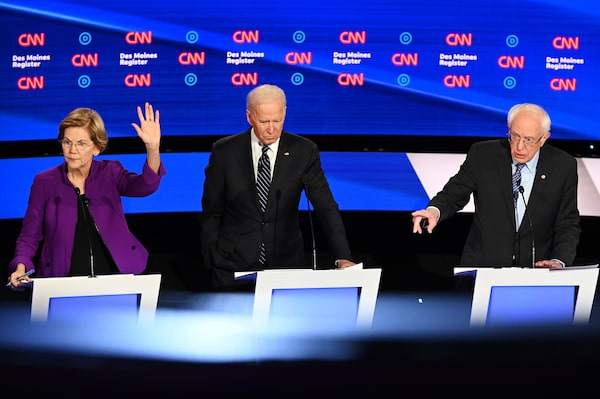
From left: Elizabeth Warren, Joe Biden and Bernie Sanders spar during the Democratic debate in Iowa on Tuesday, Jan. 14, 2020.ROBYN BECK/AFP/Getty Images
Vermont Senator Bernie Sanders targeted the U.S.’s new trade deal with Canada and Mexico at Tuesday’s Democratic presidential debate, saying the agreement would benefit “large corporations” at the expense of workers and the environment.
In the final debate before the Iowa caucuses, the first vote in the race for the Democratic presidential nomination, Mr. Sanders tried to set himself apart from the rest of the candidates by attacking President Donald Trump’s signature free-trade pact, the United States-Mexico-Canada Agreement.
“We can do much better than a Trump-led trade deal,” Mr. Sanders told the audience at Drake University in Des Moines, Iowa. “If this is passed, it will set us back a number of years. I’m sick and tired of trade agreements negotiated by the CEOs of large corporations.”
Mr. Sanders said the deal forced American workers to compete against Mexican workers earning “starvation wages” and does not go far enough in writing environmental protections into trade law. The only candidate to oppose the deal, Mr. Sanders has moved into a statistical tie with front-running former vice-president Joe Biden in Iowa.
USMCA was approved by the Democratic-controlled House of Representatives last month and is set for a vote in the Republican-led Senate later this week. The other candidates conceded that USMCA has flaws, but it is better than the North American free-trade agreement it would replace.
USMCA contains more protections for labour and environmental rights than NAFTA, as well as a provision that 40 to 45 per cent of the content of North American-made cars and trucks must come from factories paying workers at least US$16 an hour – an attempt to negate Mexico’s ability to lure jobs from the U.S. with significantly lower wages.
It also gives American dairy farmers more access to Canada’s protected milk market. Elizabeth Warren, the Massachusetts senator who is Mr. Sanders’s chief rival for votes on the party’s left, said USMCA was not a good deal but should still pass because it is an improvement on the status quo.
“Let’s help the people who need help now,” she said. “It will give some relief to our farmers. It will give some relief to our workers.”
Mr. Biden used the opportunity to portray Mr. Sanders as an unrealistic idealist who could not get things done as president.
“I don’t think there’s any trade agreement the senator would agree on,” he said.
Pete Buttigieg, the former South Bend, Ind., mayor vying with Mr. Biden for moderate voters, said USMCA was “improved” but not perfect.
Minnesota Senator Amy Klobuchar, another centrist, contended that better North American trade would allow the region to band together as a bloc to take on China, which is locked in a trade war with Mr. Trump.
Former hedge-fund manager Tom Steyer, for his part, took aim at Mr. Trump’s pending trade agreement with China, which he plans to sign Wednesday.
“I would not sign this deal until climate is also taken into consideration,” he said.
Mr. Sanders also tangled with Ms. Warren over her accusations that he privately told her a little over a year ago that a woman could not be elected president. Mr. Sanders denied making such comments.
“As a matter of fact, I didn’t say it,” he said. “It’s incomprehensible that I would think that a woman couldn’t be president of the United States.”
Ms. Warren did not back down from her accusation, and pointed out that the only people on the debate stage who had never lost an election were both women – herself and Ms. Klobuchar.
“The only person on this stage who has beaten an incumbent Republican anytime in the past 30 years is me,” Ms. Warren said, referring to her 2012 victory over then-senator Scott Brown. Mr. Sanders fired back that he had beaten a Republican in a congressional race in 1990.
“I said ‘I was the only one who’s beaten an incumbent Republican in 30 years,’” Ms. Warren replied.
“Thirty years ago is 1990, as a matter of fact,” Mr. Sanders responded, as Ms. Warren looked at him incredulously. Ms. Warren also aimed to rally the party’s left with a major promise, vowing to pull all troops from Iraq.
“We need to get our combat troops out,” she said. “We have to stop this mindset that we can do everything with combat troops.”